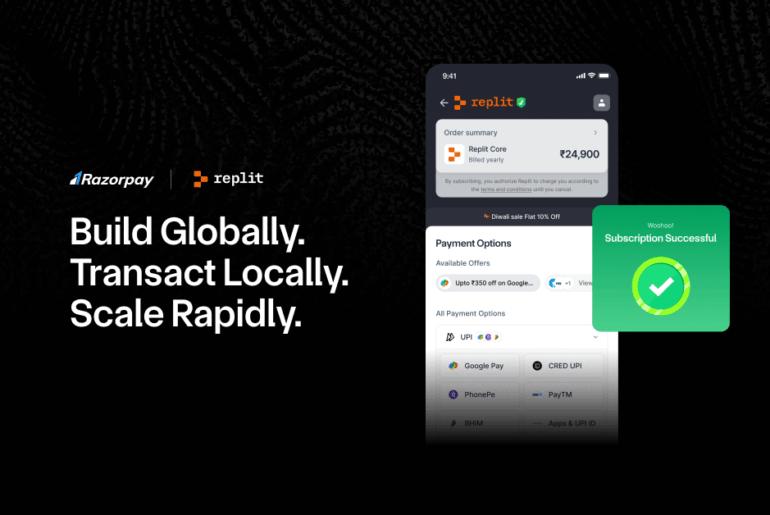Table of Contents
What Is A Payment Service Provider (PSP)?
A payment service provider (PSP), also known as a merchant service provider, is a third-party entity that facilitates electronic payment transactions for merchants. PSPs play a pivotal role in enabling businesses to accept various payments like credit and debit card transactions, direct debit, bank transfers, and real-time bank transfers through a single platform. Operating across various payment networks, PSPs ensure seamless connectivity between different financial institutions and payment systems.
Example Of Payment Service Provider
Among PSPs, Razorpay has emerged as a standout player. It offers comprehensive payment solutions that cater to businesses of all sizes. Through its full-stack payment gateway, Razorpay enables merchants to accept various payment methods like cards, UPI, net banking, and wallets. What sets Razorpay apart is its innovative suite of solutions:
- Payment Links: Allows merchants to share personalized payment requests via email, social media, or SMS payment
- Payment Buttons: Enables easy integration of payment functionality into websites.
- Capital Lending: Provides working capital loans to merchants based on their transaction history.
- Developer Tools: Offers robust APIs and analytics for seamless integration and business insights.
The Indian PSP ecosystem includes several other domestic PSP payment examples like Paytm and PhonePe. Paytm specializes in mobile wallet and e-commerce services, while PhonePe in UPI-based payment solutions. International players like Stripe, Square, and PayPal also maintain a strong presence among businesses with global customer bases.
How Does A Payment Service Provider Work?
- The customer selects the payment method and enters payment details on the merchant’s website/app through PSP’s secure checkout interface
- PSP encrypts sensitive payment data and transmits it securely to their payment gateway
- PSP conducts verification checks like payment information validation and fraud screening using advanced algorithms
- PSP sends authorisation requests to the customer’s issuing bank, which verifies fund availability and checks for suspicious activity
- Upon bank approval, PSP notifies the merchant of successful transaction authorisation
- The merchant decides whether to capture funds immediately or place a hold for future capture
- PSP initiates the settlement process to transfer funds from the customer’s account to the merchant’s account via the acquiring bank
- In case of errors, a payment reversal may be initiated to return funds to the customer’s account
- The settlement process is completed over several days depending on the payment method and agreed terms
- PSP generates detailed transaction reports for merchant tracking and reconciliation
- The merchant receives reports containing transaction amounts, payment methods, fees, and any chargebacks
PSPs ensure secure payment processing through Payment Card Industry Data Security Standard (PCI DSS) compliance. When transactions are declined due to issues like invalid cards or insufficient funds, the PSP terminates the process and sends notifications to both the merchant and the customer about the failed payment.
Beyond basic payment processing, PSPs also offer comprehensive services like:
- Multi-currency and payment method support
- Transaction reporting and analytics
- Refund and chargeback management
- Secure fund transfers and data storage
- Dispute resolution and customer support
Types Of Payment Service Providers
Payment aggregators and merchant service providers represent two distinct approaches to payment processing. Traditional methods like payment through NEFT remain popular for domestic transfers, while newer technologies are emerging.
1. Payment Aggregators:
Payment aggregators streamline the process by pooling multiple merchants under a single master account. This method reduces the complexity and time involved in payment setup. This approach allows businesses to start accepting payments quickly with minimal paperwork and underwriting requirements.
2. Merchant Service Providers (MSPs)
Merchant Service Providers offer dedicated merchant accounts with comprehensive underwriting processes. While this process is rigorous, it results in better rates for high-volume businesses and provides greater control over payment operations. MSPs typically offer customized solutions and direct relationships with acquiring banks.
3. Digital Wallet Integrators
PSPs have developed specialized market niches. Some focus on digital wallet integration like Paytm and Google Pay. These offer secure payment storage and rewards. Others handle recurring billing with automated cycles and subscription management. Global-focused PSPs manage cross-border transactions with multi-currency processing. Industry-specific PSPs serve sectors like travel.
Benefits of Payment Service Provider (PSP)
1. Multiple Payment Methods
PSPs streamline the integration of diverse payment methods through a unified platform. It eliminates the complexity of managing multiple individual integrations. Integrating various payment options like online banking, credit cards, debit cards, and e-wallets involves significant costs and technical overhead. PSPs simplify this process by providing a single, comprehensive solution that enhances customer satisfaction and convenience.
2. Secure Transactions
PSPs implement robust security measures through SSL encryption. It ensures the safe transmission and storage of sensitive payment data. This enhanced security infrastructure not only protects transaction information but also builds customer trust. It also improves payment completion rates and reduces abandonment at checkout.
3. Fraud Prevention
By implementing verification processes for customer card details before initiating fund transfers, PSPs provide an important layer of protection against fraudulent activities. Their advanced fraud detection systems and real-time monitoring capabilities safeguard businesses from potential financial losses and unauthorised transactions.
4. Acceptance of Multiple Currencies
PSPs enable businesses to process transactions in multiple currencies efficiently and securely. This capability is important for companies looking to scale globally, as it eliminates currency barriers and simplifies cross-border transactions.
5. Monthly Reporting
PSPs deliver monthly payment and transaction reporting capabilities, with many offering real-time reporting features. These detailed insights provide businesses with valuable data on their payment operations.
6. Flexibility in Adding Payment Methods
PSPs offer flexibility in integrating new payment methods. This allows businesses to quickly adapt to evolving customer preferences. This adaptability ensures that merchants can continuously offer the most convenient payment options to their customers without significant technical overhead.
7. Assistance with Acquiring Banks
PSPs streamline the merchant account application process reduce waiting times and simplify setup procedures. Many PSPs maintain existing relationships with acquiring banks. This enables them to offer sub-accounts to businesses efficiently, hence accelerating the onboarding process.
8. Efficient Transaction Reconciliation
PSPs provide detailed transaction reports across all payment methods. This helps simplify the reconciliation process for businesses. This comprehensive reporting ensures accurate financial record-keeping and efficient management of payment operations.
Discover The Range Of Services Offered By Payment Service Providers
1. Payment Security and Compliance
PSPs prioritize transaction security through robust protection measures. They maintain PCI DSS compliance standards to ensure secure payment processing. This security framework protects businesses from data breaches and builds customer trust. This results in stronger business relationships and reduced financial fraud risk.
2. Global Payment Processing Capabilities
PSPs facilitate global commerce through cross-border payment solutions. Their multi-currency processing helps businesses to expand beyond local markets. The infrastructure removes traditional barriers by handling worldwide payments and currency conversions.
3. Transaction Reporting and Reconciliation
PSPs provide reporting tools to simplify payment reconciliation. Their systems deliver detailed monthly transaction records for accurate financial tracking. Real-time reporting capabilities offer immediate visibility into transaction flows. This transparency improves efficiency and enables quick responses to payment issues.
How to choose a payment service provider?
1. Payment Options
Look for PSPs offering diverse payment methods including major credit cards, bank transfers, and digital wallets. Prioritise providers supporting emerging options like Buy Now, Pay Later (BNPL). For optimal customer satisfaction, ensure mobile payment capabilities and QR code support are included.
2. Global Capabilities
If operating internationally, global payment capabilities are crucial. Your chosen PSP should excel in multi-currency support and offer competitive conversion rates. Regional payment method coverage becomes increasingly important as you expand into new markets.
3. Pricing Structure
Consider the complete financial view like transaction percentages, monthly costs, and currency conversion fees. Many providers offer attractive volume-based discounts and beneficial long-term contract rates. This can significantly impact your bottom line as your business grows.
4. Security And Compliance
Your PSP must maintain PCI DSS certification and implement robust fraud detection tools. Advanced features like chargeback management and real-time monitoring demonstrate a provider’s commitment to protecting your business and customers.
5. Analytics And Reporting
Look for PSPs offering detailed transaction insights, customer behavior analysis, and real-time payment tracking. These tools prove invaluable for understanding payment patterns and optimizing your payment strategy.
6. Technical Integration
Seek providers offering modern API connectivity, secure checkout solutions, and flexible integration options. Responsive technical support ensures smooth implementation and ongoing operations.
7. Additional Services
When searching for service providers, look for those who offer additional features like receivables management, debt collection, and business account options. These comprehensive service offerings can support your company’s expansion.
Top Trends in Payment Service Providers
Digital wallets have evolved from basic payment apps to comprehensive financial platforms. They now support one-click checkout, cashless payments, and secure multi-payment management with end-to-end encryption. With this shift to contactless payments, tap-to-pay now has become standard across many cards. Advanced biometric payment systems are increasingly being integrated for enhanced security and user convenience. These digital wallets simplify purchases and track spending through digital receipts.
PSPs have adapted rapidly to meet modern needs. They’ve integrated AI-driven fraud detection, multi-factor authentication, and tokenization to safeguard transactions. Expanding into Buy-Now-Pay-Later, cryptocurrency, and cross-border payments, PSPs now offer enhanced support for global transactions, instant currency conversion, and automated compliance. These innovations provide businesses and consumers alike with a more efficient and reliable payment landscape.
Frequently Asked Questions (FAQs)
1. What is an example of a PSP payment service provider?
Razorpay, PhonePe, and Paytm are a few examples of payment service providers.
2. How secure are PSP payments, and what measures are in place for user protection?
PSPs implement multiple layers of security, starting with mandatory PCI DSS compliance to protect sensitive card data. All payment details are encrypted during transmission while advanced fraud detection tools using machine learning monitor transactions in real-time.
3. Can businesses customize PSP solutions to suit their specific needs?
Yes, PSPs offer flexible integration options through APIs that connect with existing business systems and websites. Merchants can maintain brand consistency by customizing payment pages with their logo and color scheme.
4. How quickly are transactions processed with PSP payments?
Transaction processing speed depends on factors like the chosen payment method and the merchant’s settlement cycle. Most PSPs prioritise quick processing often in seconds to enhance the overall payment experience.
5. What industries can benefit the most from adopting PSP payments?
Various industries can benefit from implementing PSP payment:
- E-commerce: Online retailers can accept payments securely, offer diverse payment options, and expand their reach globally.
- Hospitality: Hotels and restaurants can streamline payment processes, enable contactless payments, and integrate with booking systems.
- Education: Schools and universities can accept fees online, set up recurring tuition payments, and manage student accounts efficiently
6. What is the difference between payer PSP and payee PSP?
Payer PSP facilitates transactions on behalf of the payer (customer). It captures payment details, initiates the transaction, and ensures funds are transferred from the payer’s account. Payee PSP acts on behalf of the payee (merchant). It receives the payment information from the payer PSP, processes the transaction, and settles the funds.
7. What is a PSP wallet?
A PSP wallet is a virtual account provided by a PSP that allows users to store, send, and receive money electronically. Users can safely store their payment information like credit card details or bank account numbers in the wallet.
8. How to register a PSP in UPI?
- Apply to NPCI and fulfill eligibility criteria like a valid RBI license and technical readiness.
- Build a UPI-compliant system that aligns with NPCI’s guidelines and specifications.
- Undergo NPCI’s certification process and conduct thorough testing to ensure compliance and seamless functionality.
- After certification and testing, integrate with the UPI platform and launch UPI services for customers.


